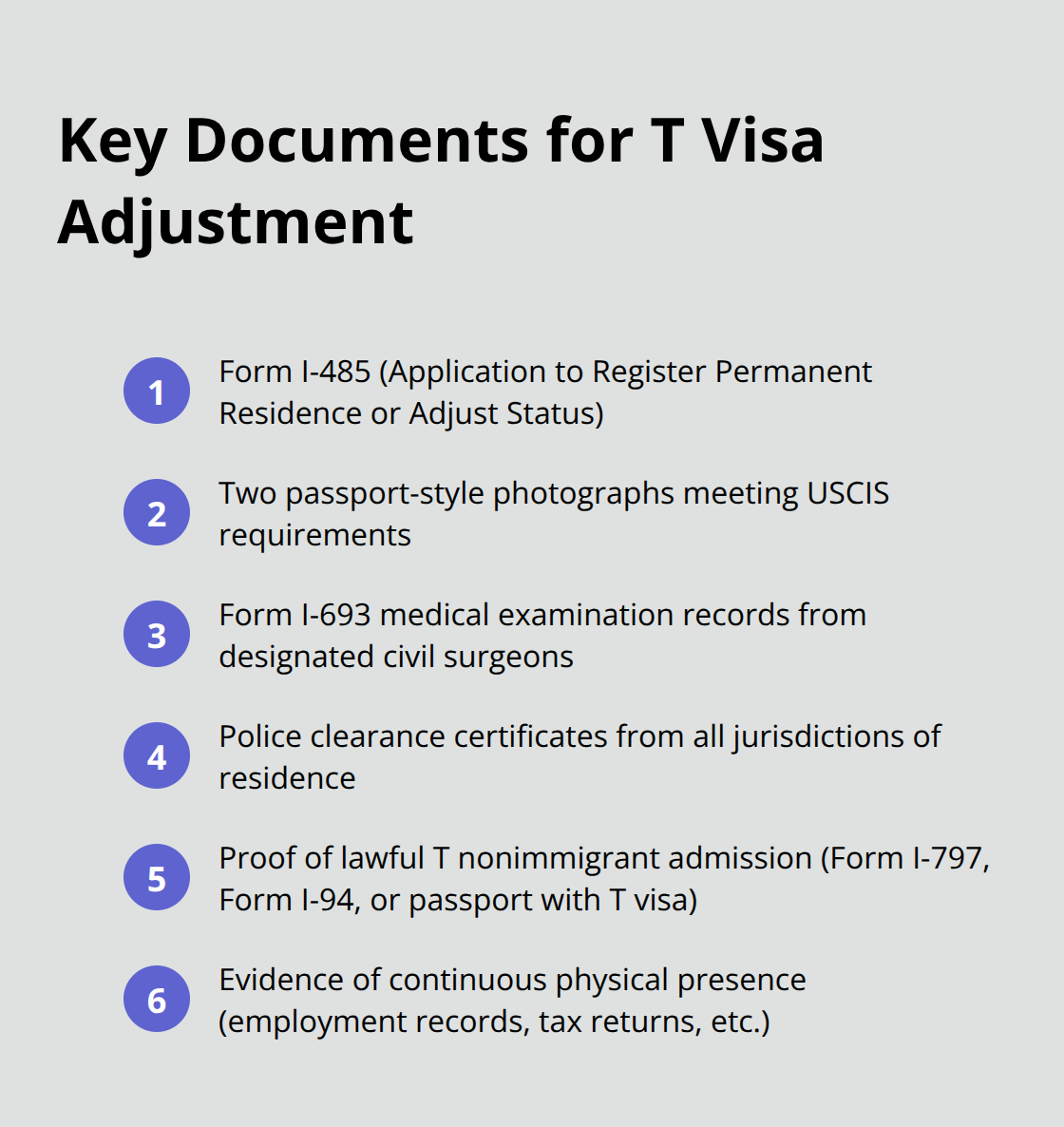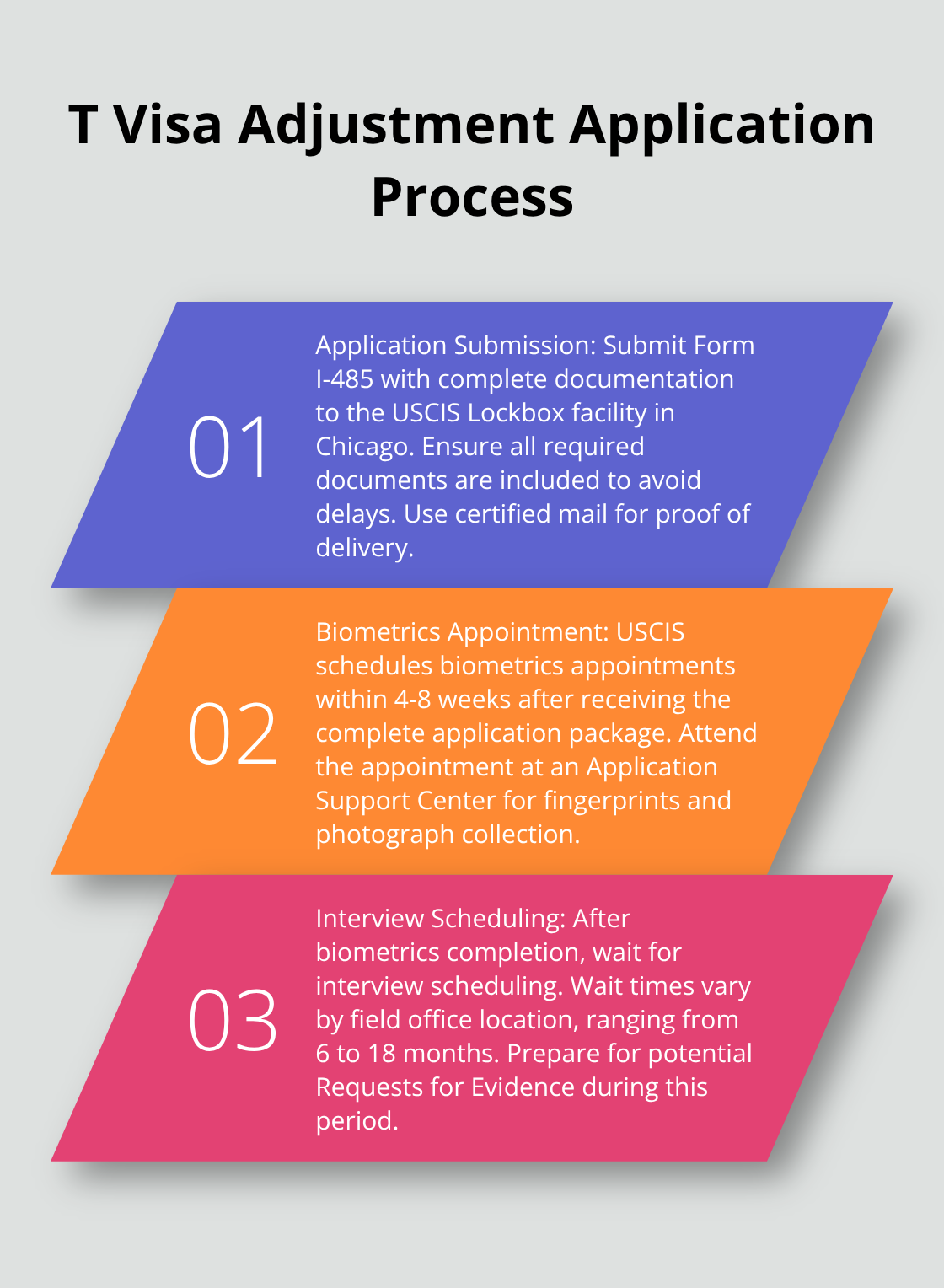
How to Apply for T Visa Adjustment of Status
T visa holders who have been trafficking victims can transition to permanent residence through adjustment of status. This process requires meeting specific eligibility criteria and submitting extensive documentation to USCIS.
We at Law Offices of Jeffrey A. Thompson guide clients through each step of the T visa adjustment of status application. The process involves strict deadlines and complex requirements that demand careful preparation.
What Makes You Eligible for T Visa Adjustment
T visa adjustment to permanent residence demands three non-negotiable requirements that USCIS scrutinizes with extreme precision. The continuous physical presence rule stands as the most challenging hurdle. Applicants must document their time spent in the United States, though documentation is not required for every single day of the requisite continuous physical presence period.
USCIS tracks this requirement through employment records, tax returns, school attendance records, and medical documentation. Applicants must submit a signed affidavit that details their continuous presence along with comprehensive evidence of any departures from the United States (including exact dates, destinations, and proof of return).

How to Document Your Physical Presence
Documentation strategies for continuous presence require strategic planning months before you file. Tax returns from the Internal Revenue Service provide the strongest evidence, followed by employment records that show consistent work history. School transcripts, medical records, and utility bills create additional layers of proof that USCIS values highly.
Travel outside the United States becomes problematic quickly. Any absence that exceeds 90 consecutive days automatically disqualifies applicants unless they can prove exceptional circumstances. Smart applicants maintain detailed personal calendars and collect receipts, bank statements, and photographs with timestamps to build an unshakeable presence timeline.
Good Moral Character Standards You Must Meet
Good moral character evaluation extends from the date of T-1 admission through the final decision on Form I-485. This creates a continuous assessment period that can span several years. USCIS requires police clearance certificates from every jurisdiction where applicants resided for six months or more (including international locations).
Criminal arrests or convictions trigger intensive scrutiny, though they don’t automatically disqualify applicants if properly addressed with court records and rehabilitation evidence. Community testimonials from employers, religious leaders, or social workers strengthen good moral character claims significantly when submitted alongside official documentation.
Law Enforcement Compliance Requirements
The compliance requirement with reasonable law enforcement requests forms the third pillar of T visa adjustment eligibility. Applicants must demonstrate they cooperated with trafficking investigations or prosecutions to the extent requested by federal, state, or local law enforcement agencies. This cooperation must continue throughout the adjustment process unless age or trauma exemptions apply.
Documentation of this compliance typically includes letters from law enforcement agencies, prosecutor offices, or other relevant authorities that confirm your cooperation. The specific forms and evidence required depend heavily on your individual case circumstances and the nature of your trafficking experience.
What Documents Do You Need for T Visa Adjustment
Form I-485 serves as the foundation document for T visa adjustment applications, but the supporting documentation package determines success or failure. USCIS requires two passport-style photographs that meet specific dimensional requirements, along with Form I-693 medical examination records that designated civil surgeons complete. The medical examination must include tuberculosis tests, syphilis tests, and verification of age-appropriate vaccinations according to CDC guidelines. Civil surgeons charge between $200 to $500 for these examinations, and appointments often require 2-3 weeks advance notice in major metropolitan areas.
Medical Records That USCIS Accepts
Civil surgeons must complete Form I-693 within 60 days of your adjustment application date, which makes coordination essential for successful submission. The examination includes mental health evaluations that can identify trauma related to human trafficking, though these assessments should never replace comprehensive psychological evaluations when trauma significantly impacts your case. Vaccination requirements follow CDC guidelines for your age group, with specific emphasis on measles, mumps, rubella, polio, tetanus, diphtheria, pertussis, Haemophilus influenzae type b, hepatitis A and B, varicella, pneumococcal disease, rotavirus, and seasonal influenza. Missing vaccinations don’t automatically disqualify applicants if medical contraindications exist or if you demonstrate previous immunity through blood tests.
Police Clearance Strategy for Complex Cases
Police clearance certificates from every jurisdiction where you lived for six months or more create the most challenging documentation requirement for T visa adjustment applicants. International clearances often take 3-6 months to obtain, particularly from countries with limited diplomatic relations with the United States. Applicants who cannot obtain clearances due to country conditions or lack of government access must submit detailed explanatory letters with supporting country condition reports from the State Department. Criminal history doesn’t automatically disqualify adjustment applications, but incomplete disclosure or missing court records trigger immediate denials that require expensive appeals processes.

Evidence of Lawful T Nonimmigrant Admission
USCIS requires proof of your lawful T nonimmigrant admission through copies of Form I-797, Form I-94, or your passport with T visa and admission stamp. These documents establish your legal entry and current status in the United States. Applicants must also submit evidence of continuous physical presence through employment records, tax returns, school attendance records, and medical records that span the required three-year period (or the duration of the trafficking investigation if shorter).
Once you gather all required documentation, the next step involves the actual application process and what to expect when you submit your package to USCIS.
How Do You File Your T Visa Adjustment Application
USCIS requires T visa adjustment applications to include Form I-485 with complete documentation submitted simultaneously in a single package. Missing documents trigger automatic Requests for Evidence that delay cases by 3-6 months, which makes thorough preparation essential. Applications must arrive at the USCIS Lockbox facility in Chicago within 30 days of medical examination completion, and certified mail provides the only reliable proof of delivery dates. The filing fee waiver applies to all T visa adjustment applicants, but money orders for biometrics appointments cost $85 per applicant aged 14-79.
Package Assembly and Submission Requirements
USCIS processes applications in the exact order they receive complete packages. Incomplete submissions face immediate rejection and return to applicants, which creates additional delays of 4-6 weeks. Each document requires clear photocopies with original signatures where specified. Applications must include cover letters that list every document in the package with page numbers for USCIS review efficiency.
The Chicago Lockbox facility accepts applications Monday through Friday, excluding federal holidays. Express mail services provide tracking numbers that confirm delivery dates, though USCIS receipt notices arrive 2-4 weeks after successful submission.

Biometrics Appointments and Scheduling
USCIS schedules biometrics appointments within 4-8 weeks after they receive your complete application package. Fingerprints and photograph collection occur at Application Support Centers nationwide, with appointments that last approximately 30 minutes. Missing your scheduled appointment without advance notice results in automatic application denial (no exceptions apply).
Interview schedules follow biometrics completion and vary dramatically by field office location. Wait times range from 6 months in rural areas to 18 months in major metropolitan centers like New York and Los Angeles. Field offices contact applicants directly to schedule interviews once background checks clear.
Response Strategy for Evidence Requests
USCIS issues Requests for Evidence in T visa adjustment cases, typically targeting continuous physical presence documentation or good moral character evidence. Response deadlines provide exactly 84 days from the notice date, with no extensions granted except in extraordinary circumstances. Successful responses require comprehensive documentation that addresses every specific question USCIS raises.
Incomplete responses trigger immediate denials that necessitate expensive Motion to Reopen proceedings. These motions take 12-18 months to resolve and require additional legal fees that often exceed $3,000. Applicants who receive evidence requests should compile all requested documents before submitting partial responses.
Final Thoughts
T visa adjustment of status applications require 12-24 months from submission to final decision, with processing times that vary dramatically by USCIS field office location. Applicants face biometrics appointments within 8 weeks, then wait 6-18 months for interviews based on office workload. The most common denial reasons include insufficient continuous physical presence documentation, gaps in good moral character evidence, and incomplete responses to USCIS evidence requests.
Missing police clearance certificates from jurisdictions where applicants lived for six months or more triggers automatic denials. Criminal history disclosure problems and inadequate law enforcement compliance documentation also lead to rejections. Complex cases that involve extensive travel history, criminal records, or missing documentation from countries with poor diplomatic relations require experienced legal guidance (immigration attorneys understand USCIS evidence standards and can develop strategies that address potential weaknesses before they become denial grounds).
We at Law Offices of Jeffrey A. Thompson help trafficking survivors navigate the adjustment process with comprehensive case preparation and strategic documentation review. Our immigration law experience helps clients avoid common pitfalls that delay or derail applications. We provide the dedicated legal representation needed for successful permanent residence applications.


